No matter what your major, you’re bound to take a class that requires you to memorize large amounts of information. Whether it’s historical dates, medical terms, equations, or quotes from your professor’s favorite TV show, memorizing information can be a challenge.
To make memorization easier, people have come up with all kinds of systems and techniques. And one of the most powerful systems is flashcards.
You probably made paper flashcards in school, but the right digital apps can make flashcards an even more powerful tool. Plus, they’re a lot easier to manage than a bunch of pieces of paper.
Since the app stores and internet are flooded with flashcard apps that all claim to be the best, it can be difficult to find the app that’s right for your needs. To save you time, we tested over a dozen flashcard apps and narrowed them down to our five favorites.
Whether you’re studying for a final exam or a standardized test like the GRE, there’s an app on this list that will make your studies easier and more effective.
Anki
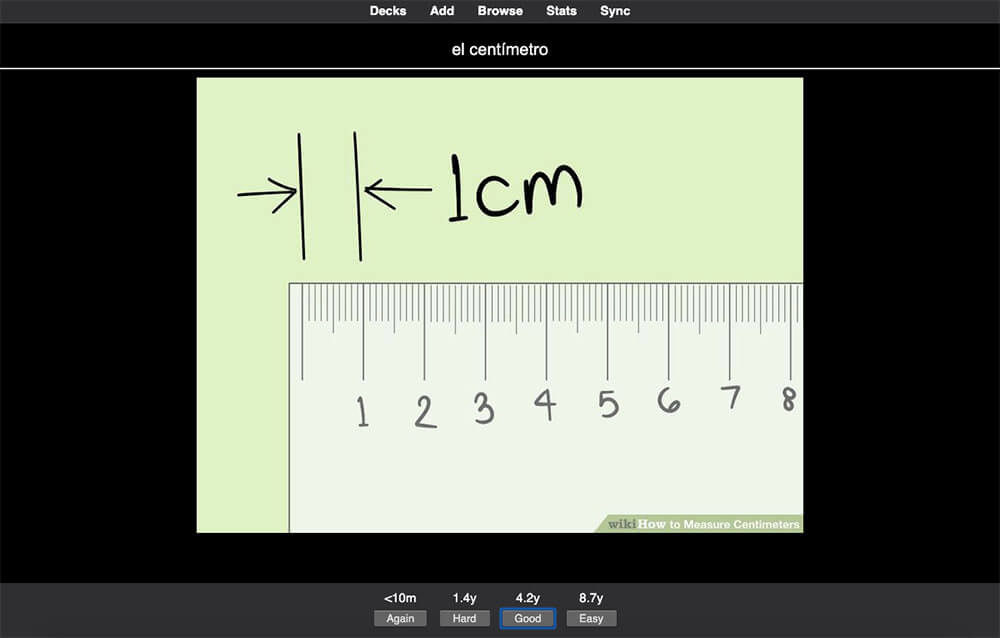
Overview: A powerful flashcard app that uses spaced repetition to make your studies more efficient and effective.
Even after testing many other flashcard apps, Anki remains my top recommendation. While some of the other apps on this list have slicker interfaces and more features, Anki remains superior for helping you learn, retain, and review information.
To use Anki, you first create a flashcard in the way you’re used to (a term on one side and a definition on the other, for example). You then organize these cards into “Decks” based on whatever information you’re trying to learn.
Once you’re ready to study, Anki will show you one side of each card. When you think you have the answer (or if you can’t remember), you flip the card over to reveal it.
After you’ve revealed the answer, Anki will ask you to rate how difficult it was for you to recall it. Based on this difficulty rating, Anki will decide when to show you the card again. This could be as soon as a few minutes from now or as long as a month.
The idea behind this is to review information only when you’re about to forget it. This way, you spend the most time studying the concepts that are difficult for you and don’t waste time reviewing information you already know.
If you’re curious to learn more about the principles that Anki is based on, check out our guide to spaced repetition.
Pricing: Free (except for the iOS app, which is $24.99)
Platforms: Android, iOS, Linux, Mac, Windows, Web
Brainscape
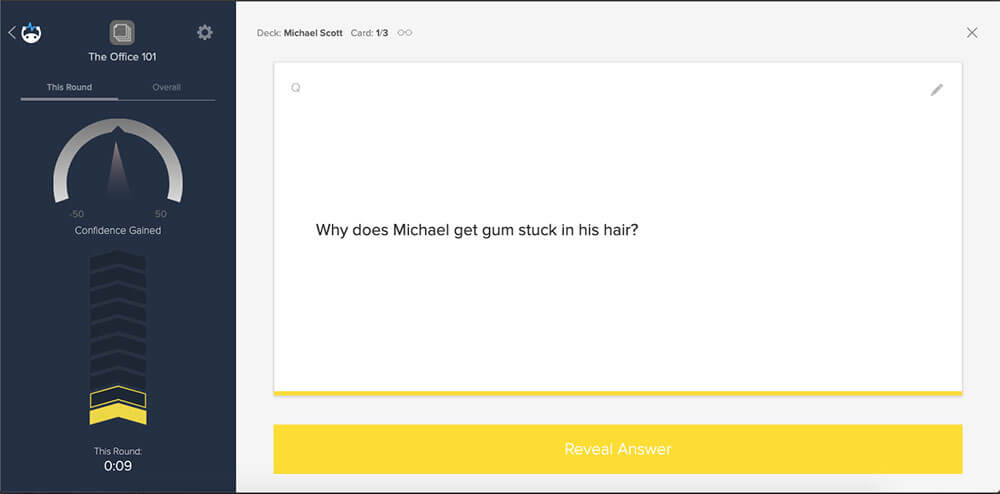
Overview: A flashcard app that uses spaced repetition, though you’ll need to upgrade to the Pro version to add images and sounds to cards.
Brainscape seems like a fairly simple flashcard app on the surface, but it includes some advanced features that are helpful for tracking your progress and ensuring that you’ve learned information thoroughly.
To get started with Brainscape, you’ll need to create a class. This could be a real class you’re taking, or just a general subject you’re learning. Within each class, you can then create decks of flashcards on more specific topics.
Creating flashcards in Brainscape is quite easy, with each card’s question in one column and the answer in another. Be aware that the free version only allows you to add text; you’ll need to upgrade to the Pro version to add images and sounds (the Pro version starts at $9.99 per month).
After you’ve created your deck, you can start studying it. When you reveal the answer to a question, Brainscape will ask you to rate how well you knew the answer on a scale of 1 (“Not At All”) to 5 (“Perfectly”).
Based on your ratings, the app assigns you a “Mastery” score ranging from 0% to 100%, and it will continue to quiz you until you’ve reached a 100% Mastery. This is more or less the same as the spaced repetition system that Anki uses.
Pricing: Free (with a Pro version that lets you add images/sounds and study other users’ flashcard decks)
Platforms: Android, iOS, Web
Quizlet
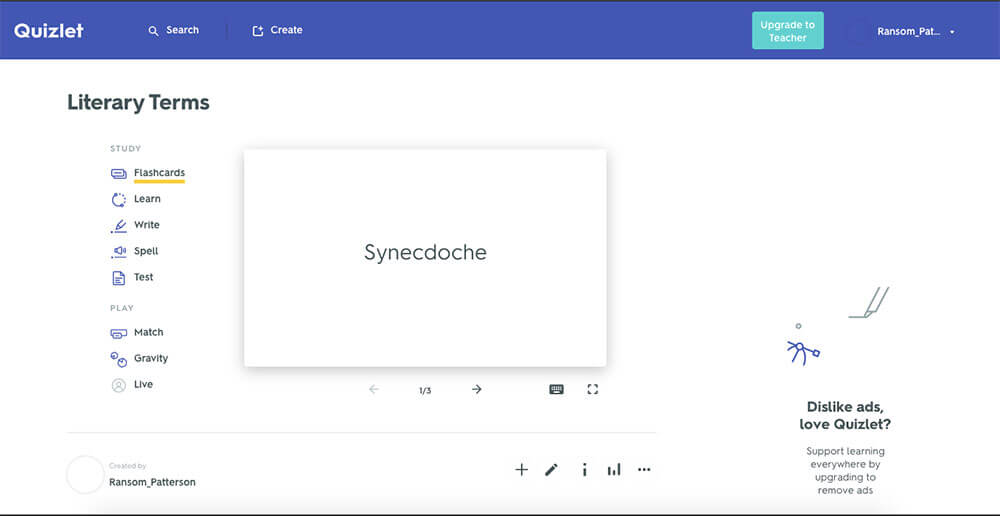
Overview: A simple flashcard app that emulates the experience of studying paper flashcards.
Are you looking for an app that mimics paper flashcards without a lot of added bells and whistles? Then Quizlet is a great choice.
Once you sign up, the app makes it simple to start creating cards on the topic of your choice. In addition to text, you can also add images from your computer or Quizlet’s library.
When it’s time to study your cards, Quizlet gives you a variety of options. You can “flip” the cards over to mimic studying paper cards, but you can also study the cards using games or fill-in-the-blank tests.
If you’re trying to learn how to spell words (such as with a foreign language or technical vocabulary), there’s also an option to listen to a computer-generated recording and type what you hear.
My only criticism of Quizlet is how it suggests answers/definitions for your cards. For instance, if you type “function” on one side of a card, Quizlet will suggest definitions like “a relation in which each element of the domain is paired with exactly one element of the range.”
While this is supposed to be a helpful feature, I don’t suggest using it. To truly learn information, you need to put it into your own words and make the cards yourself. Only then will you understand what you’re learning.
Pricing: Free (with paid, pre-made flashcard decks for specific topics)
Platforms: Android, iOS, Web
Cram
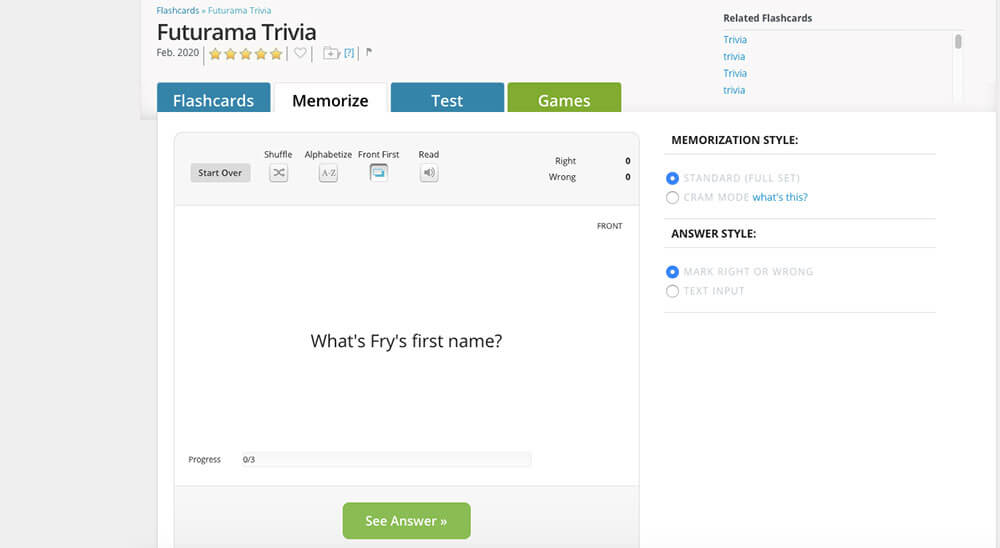
Overview: A basic flashcard app that offers a variety of ways to study your cards, including games.
Cram is a fairly straightforward flashcard app with some interesting features for reviewing and studying your cards.
To start, you create a set of flashcards with a title of your choice. From there, you add information to the front and back of the card using text and (optionally) images.
Notably, you can also create a “Hint” side to the card if you want (which can be a useful way to emulate a real person quizzing you on the cards).
From there, you have many options for studying the cards. There’s a fairly standard flashcard mode where you flip the cards, which also lets you tell the app if you got the answer wrong or right.
Cards that you get right won’t show up in future study sessions, while cards that you get wrong will appear again. This isn’t as sophisticated as the system in Anki or Brainscape, but it’s still helpful.
Beyond the basic flashcard mode, you can also choose to study your cards using matching, multiple-choice, true/false, or fill-in-the-blank tests.
There are even two games you can use to study, “Jewels of Wisdom” and “Stellar Speller.” While interesting, I’m not sure how much learning value there is in these games (though that could just be my preference).
Pricing: Free (with a paid option that removes ads and gives you additional formatting tools)
Platforms: Android, iOS, Web
IDoRecall
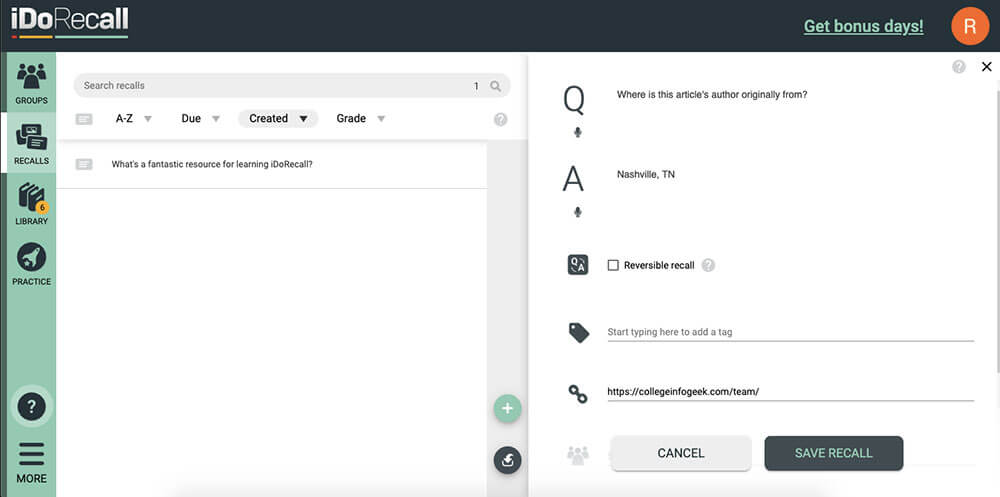
Overview: A flashcard app that integrates with your study materials.
IDoRecall is a spaced repetition flashcard app, similar to Anki. However, it also has some important and exciting differences.
Most notably, IDoRecall is an app designed specifically for studying academic material. Instead of leaving you to create cards on your own, the app lets you upload the material you’re studying and create cards directly from it.
These cards then link back to the study material, letting you quickly refresh your memory if you can’t remember something when you’re reviewing it.
The app supports a variety of media formats, including PDFs, PowerPoints, Word Docs, images, and YouTube videos. And once you’ve created your cards, IDoRecall uses spaced repetition to ensure you only study the material you’re about to forget.
Finally, the app lets you create virtual study groups where you can share files and learning materials with classmates. This is extremely helpful if you’re studying with a group for a big exam.
Pricing: A free version is available with a limit of 200 cards and 10 MB of file storage. To get unlimited cards and file uploads, you’ll need to subscribe to the paid plan for $96 / year or $16 / month.
Platforms: Web (though the company claims that desktop apps for Windows, Mac, and Linux are in development)
Flashcards Are About Technique (Not Apps)
I hope this guide has helped you find a flashcard app to improve your studies.
But I also want to emphasize that to truly succeed with flashcards, you need to learn how to create them correctly. The best app in the world isn’t very useful if you’re not writing effective questions.
For more information on how to make and study flashcards (on paper or digitally), check out this guide.
Image Credits: file cabinet


